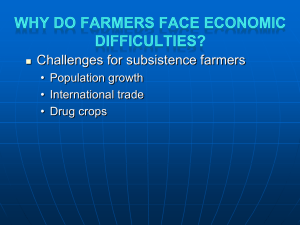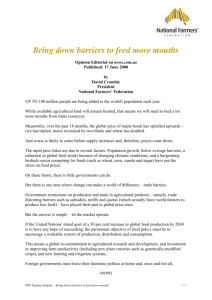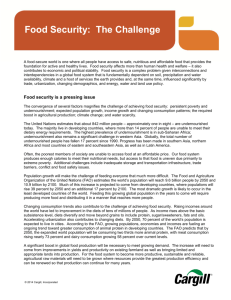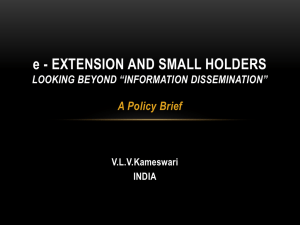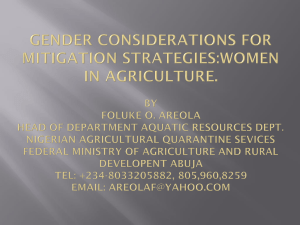Important Role of Governments in Achieving Food Security
advertisement
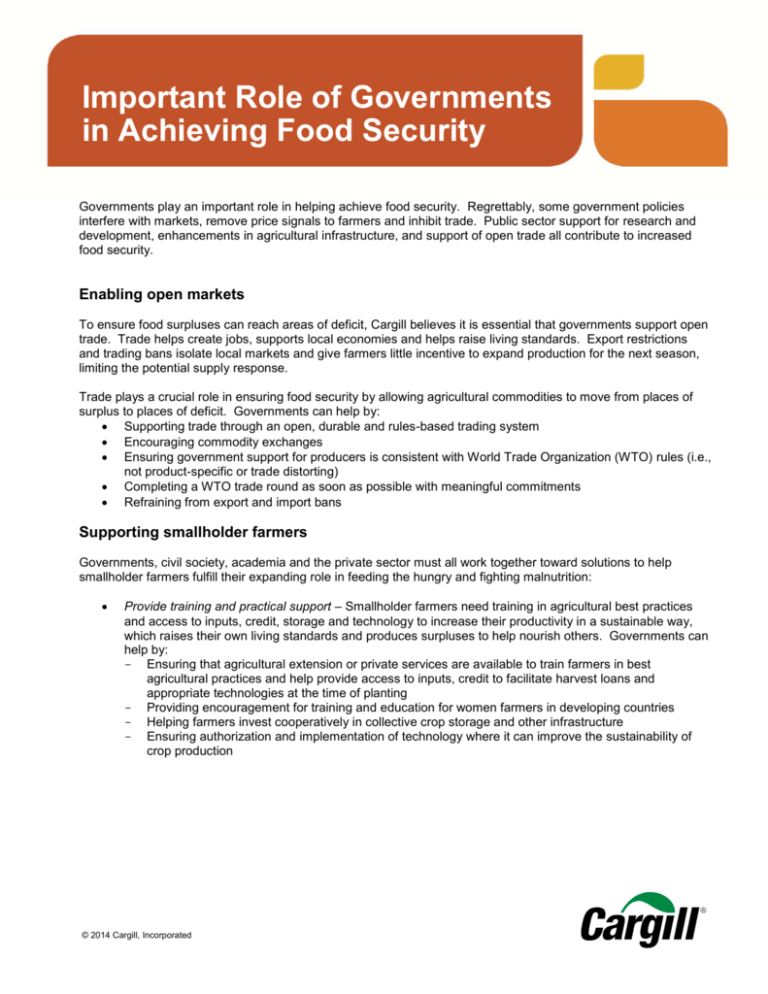
Important Role of Governments in Achieving Food Security Governments play an important role in helping achieve food security. Regrettably, some government policies interfere with markets, remove price signals to farmers and inhibit trade. Public sector support for research and development, enhancements in agricultural infrastructure, and support of open trade all contribute to increased food security. Enabling open markets To ensure food surpluses can reach areas of deficit, Cargill believes it is essential that governments support open trade. Trade helps create jobs, supports local economies and helps raise living standards. Export restrictions and trading bans isolate local markets and give farmers little incentive to expand production for the next season, limiting the potential supply response. Trade plays a crucial role in ensuring food security by allowing agricultural commodities to move from places of surplus to places of deficit. Governments can help by: Supporting trade through an open, durable and rules-based trading system Encouraging commodity exchanges Ensuring government support for producers is consistent with World Trade Organization (WTO) rules (i.e., not product-specific or trade distorting) Completing a WTO trade round as soon as possible with meaningful commitments Refraining from export and import bans Supporting smallholder farmers Governments, civil society, academia and the private sector must all work together toward solutions to help smallholder farmers fulfill their expanding role in feeding the hungry and fighting malnutrition: Provide training and practical support – Smallholder farmers need training in agricultural best practices and access to inputs, credit, storage and technology to increase their productivity in a sustainable way, which raises their own living standards and produces surpluses to help nourish others. Governments can help by: - Ensuring that agricultural extension or private services are available to train farmers in best agricultural practices and help provide access to inputs, credit to facilitate harvest loans and appropriate technologies at the time of planting - Providing encouragement for training and education for women farmers in developing countries - Helping farmers invest cooperatively in collective crop storage and other infrastructure - Ensuring authorization and implementation of technology where it can improve the sustainability of crop production © 2014 Cargill, Incorporated Establish revenue certainty – Smallholder farmers often are forced to sell at harvest when they are cash flow destitute and have limited access to real credit. Selling at depressed prices creates a cycle of discouraging further production in future years. Farmers in developing countries need reliable markets to sell their crops each season and an adequate price to compensate them for their efforts and provide incentive to continue production the following year. Governments can help by: - Establishing and maintaining good agricultural policies that include revenue assurance programs, such as guaranteed prices that may require supplemental payments in difficult years - Working with the private sector to support producer associations or price pooling cooperatives, which give farmers improved access to markets and greater leverage in pricing their products - Providing revenue safety nets themselves - Encouraging the private sector to provide price assurances through their contracts with farmers Manage risk – Farmers need access to crop insurance and other risk management tools so they can rebound from crop failures or other growing season fluctuations. Governments can help by: - Instituting regulatory frameworks that uphold market price discovery systems in a transparent way - Providing regulatory frameworks that give farmers access to risk management tools, such as properly regulated futures markets - Stimulating the provision of crop insurance either through government-funded programs or through incentives for the private sector to provide such programs Clarify rural property rights – Farmers must be able to own their land and pledge it as collateral if they are expected to reinvest and raise their productivity over time. Governments can help by: - Clarifying rural property rights or title to the land where this is currently unclear - Providing a stable system of government and the rule of law Investing in agriculture Greater investment in agriculture by the public and private sectors is necessary to increase global food production. A boost in funding and attention in the following key areas is needed: transportation, distribution, storage and energy infrastructure; agricultural research and development; agricultural science, extension, education and the promotion of best practices; and governance around legal and business structures to encourage private sector investment. Governments can help by: Committing to spend a greater proportion of their investment budgets on agricultural science, extension, education and the promotion of agricultural best practices Encouraging public and private investment in appropriate physical infrastructure, including transport and distribution networks, energy production and distribution, and storage infrastructure Increasing government commitment to agricultural research and development while supporting private sector investment in agricultural technology Establishing appropriate governance frameworks around property rights, the rule of law, business structures and taxation to encourage private sector investment in agriculture Harmonizing food safety standards To move food efficiently, predictable, science-based global food safety standards are needed to manage risk, provide transparency and ensure accountability. Governments can help by: Adopting international food safety standards Ensuring government regulatory frameworks require private operators to implement food safety standards, such as HACCP (hazard analysis and critical control points) and other preventive programs Supporting international standards for risk assessment and risk management, such as standards for agricultural biotechnology and other technologies, to improve predictability and access to global food and feed supply chains Investing in appropriate port, distribution and transportation physical infrastructure Ensuring regulation of customs controls does not unnecessarily impede the movement of goods © 2014 Cargill, Incorporated Reforming biofuels mandates Demand for biofuels has spurred investment in agriculture, but mandated use of biofuels creates inelastic demand and increased volatility in the food system. To help balance food, animal feed and biofuel uses of agricultural feedstocks, governments can help by: Taking steps to ensure biofuels are not prioritized as outlets for raw materials that also serve the food market, including ensuring biofuels policies include waivers or other trigger mechanisms to lift mandates in times of stress so that the market can direct short crops to those sectors where they are most needed Reducing environmental impact As populations continue to grow and incomes rise, the need to produce more food will place increasing demands on the environment and intensify the challenge of protecting high conservation value forest areas and biodiversity. Agriculture will need to make better use of natural resources – especially water and land – through innovation and conservation. Governments can help by: Clearly identifying the most environmentally sensitive areas as unavailable for agricultural development and devising systems to enforce compliance Ensuring government support to producers incentivizes them to use environmental best practices, such as drip irrigation and precision fertilization systems that minimize input use Encouraging research in systems that aid water and carbon measurement and pricing in areas where markets currently cannot price environmental goods, such as water for agriculture or in the food chain Facilitating emergency food aid To ensure access to food in times of crisis, governments can help by: Providing mechanisms for temporary assistance to consumers who are otherwise unable to access food, ensuring that the demand side of the market continues to operate Providing mechanisms and programs to assist farmers during crop failures so they are able to plant crops for the next year, thereby ensuring that the supply side of the market continues to operate Providing funding (not only in-kind contributions) to the World Food Programme to enable it to purchase food as and where most appropriate to address dire emergencies Improving current stocks-to-use ratios of major crops by encouraging sustainable production and functioning markets with public and private stocks rather than focusing on holding public stocks Ensuring that any public stocks held by governments are clearly targeted only for emergency use with transparent rules for buying in and selling out in order to avoid disrupting the normal passage of accurate price signals to farmers August 2014 © 2014 Cargill, Incorporated

